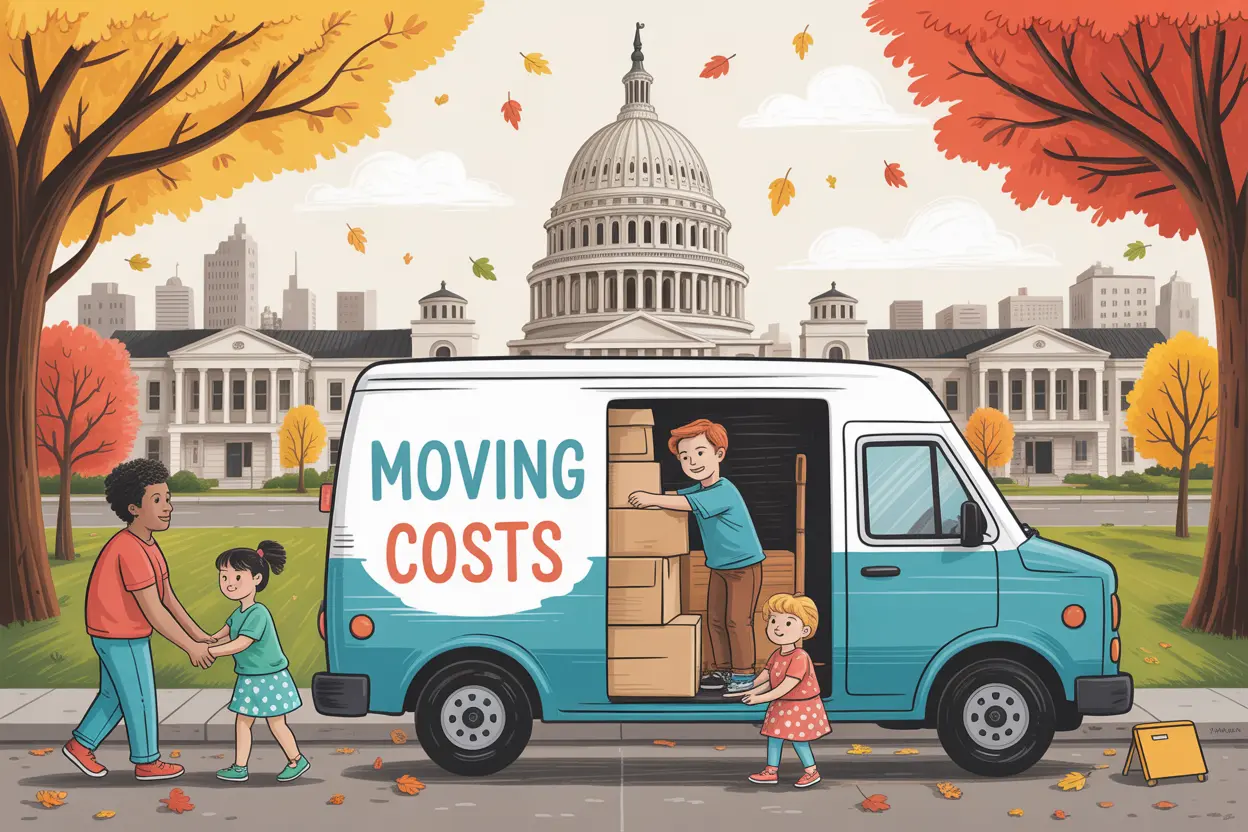Moving Costs in Washington, DC: What to Expect in 2026

Planning a move to, from, or within Washington, DC in 2026? Whether you’re relocating for work, family, or a new adventure, understanding the cost of moving in Washington DC 2026 is crucial to budgeting properly. With rising inflation and evolving real estate trends, moving expenses in Washington DC are expected to fluctuate. This comprehensive guide will help you understand the full scope of relocation expenses in Washington DC and provide insights into how costs could change through 2026.
Having a clear grasp of your moving budget helps determine which services can be outsourced and which tasks can be handled independently. It also prepares you for hidden costs that may arise, giving you a better chance of staying within your financial plan. Let’s dive deeper into the core components influencing your moving costs and how you can gain better control over them.
What Factors Impact Washington DC Moving Costs in 2026?
The moving costs in Washington, DC depend on several key factors. Understanding these can help you make smarter decisions and reduce unexpected fees.
1. Type of Move
The two primary types of moves are local and long-distance. A local move within Washington, DC typically costs less than a move to another state — especially a cross-country relocation. For example:
- Local move: Generally charged hourly. Expect to pay between $100 and $150 per hour for a standard moving crew in 2026.
- Long-distance or cross-country move: Priced based on distance, the weight of belongings, and additional services. Cross-country moving costs from Washington DC could range from $4,000 to over $10,000, depending on the destination and size of the move.
Keep in mind that for moves between states, additional licensing requirements may also affect pricing, especially if crossing through toll-heavy areas or states with unique regulatory structures.
2. Volume and Weight of Items
The more you need to move, the more you can expect to pay. Movers calculate costs based on the cubic feet or weight of your household goods, which directly affects labor and transport requirements.
Be sure to create an inventory list of your belongings before receiving quotes. This helps moving companies provide more accurate estimates and prevents cost surprises on moving day. High-volume furniture pieces like sectionals, large wardrobes, and gym equipment will significantly impact cost calculations.
3. Accessibility and Logistics
DC’s unique urban landscape — with narrow roads, parking difficulties, and building access restrictions — can also impact the cost of moving in Washington DC 2026. If your building has stairs instead of elevators or limited truck access, expect to pay extra for the added labor and time.
It’s also worth noting that permits may be required for loading zones, especially in highly congested neighborhoods. These permits can cost $30–$100 and should be factored into your moving budget.
4. Time of Year
Summer months usually have the highest demand for movers, which leads to increased rates. If you’re planning a move between May and September, be prepared for higher moving expenses Washington DC. Consider moving during off-peak months for potential savings.
In addition, the first and last weekends of the month tend to be popular due to lease turnover, so scheduling in the middle of the month or during weekdays may lead to lower rates and more flexible service options.
5. Additional Services
Relocation expenses in Washington DC increase if you opt for services such as packing, disassembly/reassembly of furniture, storage, or insurance. Many Washington moving company firms offer customizable packages, so you can tailor your services to your budget and needs.
For instance, hiring professional packers can cost an extra $300–$1,000 depending on home size, while full-value insurance coverage offers better peace of mind than basic released value protection, albeit at a higher cost.
Average Moving Costs in Washington DC for 2026
Exact prices will vary, but here are some solid estimates to help you plan your relocation costs effectively in 2026:
- Studio Apartment (Local): $400–$800
- One-bedroom (Local): $600–$1,000
- Two-bedroom (Local): $900–$1,500
- Three-bedroom and larger (Local): $1,400–$2,500
- Long-distance (Cross-country 1,000–2,000 miles): $4,000–$12,000
These estimates include truck fees, labor, and limited supplementary services. You can use these numbers to create preliminary moving budgets.
Keep in mind that additional add-ons like last-minute bookings, rush packing, or overnight storage could push you toward the higher end of these ranges. It’s always best to request binding estimates when locking in prospective movers.
Cross-Country Moving Costs from Washington DC
Cross-country moving costs from Washington DC can escalate quickly. Here’s a breakdown of factors that determine those costs:
- Distance: The longer the move, the more expensive it becomes. For instance, relocating to Los Angeles or Seattle can cost upwards of $10,000.
- Weight: Moving a four-bedroom house (approximately 9,000 lbs) will cost significantly more than a one-bedroom apartment (around 2,000 lbs).
- Route and fuel prices: Fuel costs and route accessibility affect interstate moving rates. Expect fluctuations based on economic and fuel market trends in 2026.
- Storage needs: Temporary or long-term storage is often necessary during a long-distance move. Storage units in DC can range from $75 to $300 per month.
Additionally, insurance coverage becomes more critical in long-distance moves, as there’s a greater chance of delays, damage, or loss due to extended travel and handling.
Relocation Expenses in Washington DC for 2026
Moving isn’t just about the truck and labor. Relocation expenses in Washington DC include several ancillary costs that many overlook:
1. Temporary Housing
If there’s a gap between your move-out and move-in dates, you may need short-term lodging. In 2026, hotel rates or furnished rentals in DC could range from $120–$300 per night.
Corporate housing and Airbnb-style rentals may offer weekly or monthly rates that are more economical, especially for families or multi-week transitions.
2. Deposits and Utility Setup
Budget for electric, gas, water, and internet installations, which may include activation fees or security deposits — often totaling $200–$500.
Some utility companies provide bundled services that may include promotional pricing for early sign-ups, and enrolling ahead of arrival may reduce wait times and setup delays.
3. Cleaning Services
Hiring professionals to deep clean your old or new residence can cost anywhere from $150–$400 depending on property size.
Some landlords and property managers may withhold portions of your security deposit if the space isn’t cleaned thoroughly, so investing in this service may actually save you money in the long run.
4. Travel Expenses
If you’re moving from or to DC via air or car, don’t forget airfare, meals, gas, and lodging along the way.
Adding pet transportation, rental car costs, toll roads, or vehicle shipping services can increase travel expenses significantly, so include those in your cost forecast if applicable.
How to Reduce Moving Expenses in Washington DC
Cutting costs without compromising quality is possible with thoughtful planning. Here are actionable ways to trim your moving bill:
- Declutter Your Home: Sell or donate items you don’t need. Fewer items equal reduced weight and labor costs.
- Choose the Right Movers: Compare estimates from multiple movers, check reviews, and verify credentials.
- Time It Right: Schedule your move during weekdays or off-peak seasons (late fall or winter).
- Use Free Packing Supplies: Source used boxes through local recycling centers or online communities like Freecycle.
- Bundle Services: Some moving companies offer discounts when combining services like packing, transportation, and storage.
Also, consider performing minor tasks yourself. For example, disassembling beds or unplugging appliances on moving day can save movers time, reducing your hourly labor charges.
Expert Tip: Work with a Trusted Washington Moving Company
For the most accurate estimates and seamless service, consider working with a reputable Washington moving company. Experienced professionals can help you navigate logistical challenges while keeping costs predictable and transparent. Always request in-home or virtual surveys for the best assessment of your specific situation.
Look for movers certified by the American Trucking Association or holding ProMover credentials, which signal professionalism and accountability under national industry standards.
Conclusion
Whether you’re relocating within the city, moving across the country, or downsizing for a new chapter, being informed about the moving costs and relocation expenses in Washington DC is the first step toward a stress-free move. As 2026 approaches, expect moderate increases in labor and fuel prices to influence your total cost of moving in Washington DC 2026. With thorough planning, transparent quotes from professional movers, and strategic budgeting, you can make sound financial decisions for your next move.
Stay proactive — book your movers well in advance, ask detailed questions during consultations, and keep a checklist to avoid oversight. Each step you take in preparation will reduce both financial and emotional stress throughout the relocation process.



